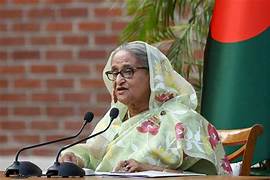
Bangladesh Ex-PM Hasina Sentenced to Six Months for Contempt of Court

 :
| Updated On: 03-Jul-2025 @ 1:04 pm
:
| Updated On: 03-Jul-2025 @ 1:04 pmSHARE
Bangladesh’s former Prime Minister Sheikh Hasina, currently in self-exile, has been sentenced to six months in prison by the International Crimes Tribunal (ICT) for contempt of court. The three-member tribunal, led by Justice Golam Mortuza Mozumder, announced the verdict on Wednesday in Hasina’s absence. Chief Prosecutor Muhammad Tajul Islam stated that the sentence will be enforced once Hasina is either arrested or voluntarily surrenders.
Hasina fled to India in August last year following a massive student-led uprising that resulted in the fall of her government. Since then, she has faced multiple charges related to her administration, but this is the first time she has received a formal sentence in any of the cases.
The contempt of court charges are based on an audio recording in which Hasina is allegedly heard saying, “There are 227 cases against me, so I now have a licence to kill 227 people.” A government forensic report has verified the authenticity of the tape. Alongside Hasina, Shakil Akand Bulbul, a prominent figure in the banned student wing of the Awami League, the Chhatra League, has also been sentenced to two months in prison in the same case.
Interestingly, the ICT was originally formed in 2010 by Hasina’s own administration to prosecute war crimes committed during Bangladesh’s 1971 war of independence. However, under the current interim government led by Nobel Peace Prize laureate Muhammad Yunus, the tribunal’s mandate has shifted. It is now being used to investigate and prosecute alleged human rights violations and corruption committed during Hasina’s time in power.
The tribunal has already issued three arrest warrants for Hasina. One of these includes charges of crimes against humanity connected to the violent suppression of student-led protests in 2023, which eventually led to her ousting. Her political party, the Awami League, has since been banned, and trials are ongoing against several of its former leaders and officials.
Supporters of Hasina argue that the charges and legal actions against her are politically motivated. They claim that the trials are part of a broader attempt by the current administration to suppress political dissent and eliminate opposition voices. They view the tribunal's actions as retribution disguised as justice.
However, the interim caretaker government defends the legal proceedings, asserting that they are essential to restoring the public’s confidence in the justice system and promoting accountability. Officials argue that years of unchecked power and corruption under Hasina’s rule have undermined Bangladesh’s democratic institutions, and the current legal process is necessary to set things right.
This case marks a significant turning point in Bangladesh's political landscape. It highlights the shifting role of legal institutions in times of political transition and underscores the deep divisions within the country's political system. As trials continue and the search for justice unfolds, the future of Sheikh Hasina and her party remains uncertain, with the outcome likely to shape Bangladesh’s governance and democratic evolution in the coming years.